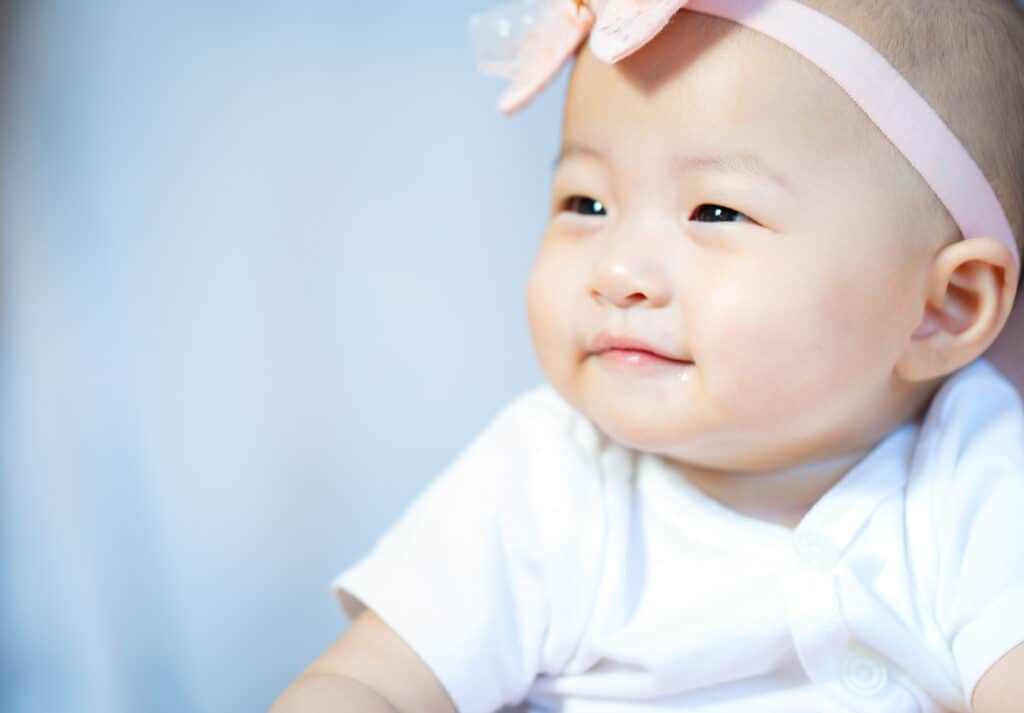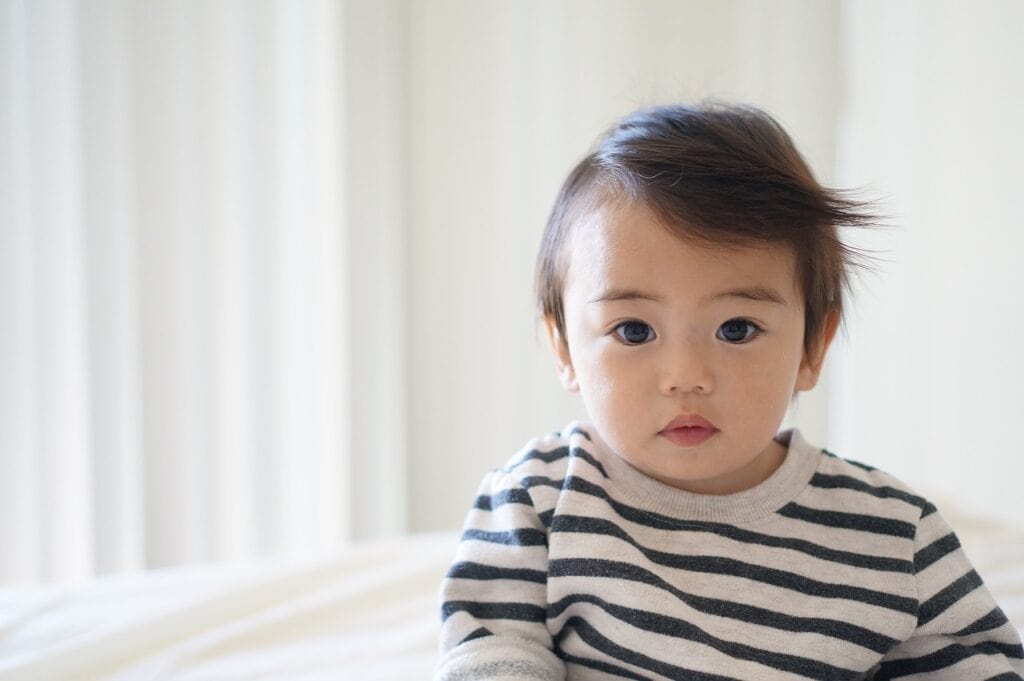Japanese culture is rich with tradition and symbolism, and Japanese names reflect this in their meanings and origins. Choosing a name for a baby girl is an important decision for parents, and Japanese girl names offer a wide variety of beautiful and meaningful options.
From traditional names that reflect the beauty of nature to modern names that reflect contemporary culture, there are many popular Japanese baby girl names to choose from.

Japanese girl names often have meanings that reflect nature, such as Sakura (cherry blossom), Yuki (snow), and Hana (flower). These names not only capture the beauty of the natural world but also represent qualities such as purity, grace, and resilience.
Other popular Japanese girl names have meanings that reflect desirable qualities such as intelligence, kindness, and strength. For example, the name Akira means “bright” or “intelligent,” while the name Emiko means “smiling child.”
Whether parents are looking for a traditional name that reflects their Japanese heritage or a modern name that reflects contemporary Japanese culture, there are many popular Japanese baby girl names to choose from. This article will explore 100 of the most popular Japanese girl names, their meanings, and their origins, to help parents find the perfect name for their new arrival.
100 Popular Japanese Baby Girl Names
Japanese culture is known for its unique and beautiful names. If you’re looking for a name for your baby girl, here are 100 popular Japanese baby girl names with their meanings.
You also don’t want to miss these other cute & adorable baby names:
Names Starting With ‘A-B’ With Meaning
- Ai – Love
- Aiko – Love child
- Airi – Love jasmine
- Akari – Light
- Akemi – Bright and beautiful
- Aki – Autumn
- Arisa – Beautiful blossom
- Asa – Morning
- Asami – Morning beauty
- Ayumi – Pace
- Beniko – Crimson child
- Botan – Peony (a type of flower)
- Bunko – Literary child
- Byakko – White light
- Bara – Rose
- Biliko – Beautiful moon
- Bisei – Beautiful star
- Baika – Plum blossom fragrance
- Biori – Gentle weave
- Bihaku – Beautiful and white
- Bunka – Cultural flower
- Biseki – Beautiful stone
Names Starting With ‘C-D’ With Meaning
- Chiharu – Clear sky
- Chika – Near, wisdom
- Chisaki – A thousand blossoms
- Chiyo – A thousand generations
- Chie – Wisdom
- Chika – Wisdom and grace
- Chinami – A thousand waves
- Chitose – A thousand years
- Chiyoko – Child of a thousand generations
- Coco – Child of happiness
- Daiya – Diamond
- Daisuki – Beloved
Names Starting With ‘E-F’ With Meaning

- Emi – Beautiful blessing
- Eriko – Blessed child
- Etsuko – Joyous child
- Emiko – Smiling child
- Eiko – Prosperous child
- Eri – Blessed prize
- Ema – Blessed picture
- Etsu – Joy
- Eriko – Child blessed with beauty
- Emiri – Beautiful village
- Fumiko – Child of abundant beauty
- Fujiko – Wisteria child
- Fuyuko – Winter child
- Fumie – Beauty and blessings
- Fumina – Beautiful greens
- Fumiko – Child of abundant beauty
- Fujita – Wisteria field
- Fuyumi – Winter beauty
- Fumina – Beautiful greens
- Fuuka – Gentle flower
Names Starting With ‘G-H’ With Meaning
- Genki – Energetic and lively
- Ginko – Silver child
- Goro – Fifth-born child
- Ginji – Silver child
- Gakuko – Learned child
- Giselle – Beautiful moon
- Goei – Five blessings
- Goro – Fifth son
- Gyoko – Jewel child
- Ginya – Silver night
- Hikari – Light
- Haruka – Distant
- Hinata – Sunflower
- Hanabi – Fireworks
- Haruko – Spring child
- Hana – Flower
- Harumi – Spring beauty
- Hatsuki – First moon
- Hoshiko – Star child
- Hanae – Blossoming grace
Names Starting With ‘I-J’ With Meaning
- Ichika – One thousand flowers
- Isamu – Courageous, brave
- Iku – Nurturing
- Itsuki – Moon tree
- Izumi – Spring, fountain
- Iori – Color of the sky
- Iwa – Rock
- Ikuo – Fragrance of flowers
- Iwa – Stone
- Inori – Prayer
- Ichika – One thousand flowers
- Isamu – Courageous, brave
- Iku – Nurturing
- Itsuki – Moon tree
- Izumi – Spring, fountain
- Iori – Color of the sky
- Iwa – Rock
- Ikuo – Fragrance of flowers
- Iwa – Stone
- Inori – Prayer
Names Starting With ‘K-L’ With Meaning

- Kaede – Maple tree
- Kairi – Sea, ocean village
- Kohana – Little flower
- Kokoro – Heart, soul
- Kiyomi – Pure beauty
- Kumiko – Long-time beautiful child
- Kana – Powerful
- Kiyoko – Pure child
- Kiko – Chronicle child
- Koharu – Small spring
- Laika – Elegant flower
- Lina – Bell or chime
- Lumi – Light
- Lika – Elegant flower
- Leiko – Ardent, enthusiastic child
- Luna – Moon
- Linako – Small, fine child
- Liora – Light for me
- Liyana – Gentle, soft
- Lumi – Snow
Names Starting With ‘M-N’ With Meaning
- Mei – Beautiful
- Michi – Pathway
- Mika – Beautiful fragrance
- Mizuki – Beautiful moon
- Midori – Green
- Minami – South
- Momoko – Peach blossom
- Mariko – Child of true reason
- Mai – Dance
- Mirei – Beautiful and elegant
- Natsuki – Summer moon
- Natsumi – Summer beauty
- Nana – Seven
- Naomi – Honest and beautiful
- Natsuko – Summer child
- Nao – Honest
- Nami – Wave
- Noriko – Child of the law
- Naho – Honest and obedient
- Natsuko – Summer child
Names Starting With ‘O-P’ With Meaning

- Otoha – Sound of the leaf
- Ouka – Cherry blossom fragrance
- Omi – Beauty of the sea
- Otoe – Sound of blessing
- Orino – Beautiful field
- Oshiro – White castle
- Oshun – Sound of the tide
- Omika – Ocean fragrance
- Oyuki – Snow child
- Oyone – Sound of blessing
- Pina – Jasmine
- Piyoko – Fragrant child
- Pomi – Beautiful sea
- Pua – Flower
- Panako – Sweet child
- Palina – Bamboo moon
- Parel – Pearl
- Piroko – First-born child
- Pina – Jasmine
- Piri – Beautiful jasmine
Names Starting With ‘Q-R’ With Meaning
- Qumi – Beautiful sea
- Riko – Jasmine child
- Rin – Dignified
- Reina – Beautiful and elegant
- Risa – Flower village
- Rika – True fragrance
- Riko – Jasmine child
- Rumi – Beautiful flow
- Rina – Jasmine
- Rei – Beautiful
- Raiko – Prosperous child
Names Starting With ‘S-T’ With Meaning
- Tsubaki – Camellia flower
- Tsumugi – Woven fabric
- Tamiko – Child of many beauties
- Takara – Treasure
- Tomomi – Beautiful friend
- Teruko – Shining child
- Tsukiko – Moon child
- Tama – Jewel
- Taeko – Child of bamboo
- Toki – Time
- Sakura – Cherry blossom
- Sora – Sky
- Sumire – Violet
- Satsuki – Fifth month (May)
- Shiori – Bookmark
- Suzu – Bell
- Saki – Blossom
- Serika – Serene flower
- Sayuri – Small lily
- Shizuka – Quiet and calm
Names Starting With ‘U-V’ With Meaning

- Ume – Plum blossom
- Uki – Floating
- Umi – Sea
- Uta – Song
- Umea – Plum blossom love
Considering that the letter “V” is not a native sound in Japanese, there are no traditional names starting with “V.”
Names Starting With ‘W-X’ With Meaning
- Wakana – Harmonious music
- Wakumi – Beautiful cloud
- Washi – Harmony
- Waka – Young, fresh
- Wisteria – Inspired by the English word for the beautiful flowering plant, “Fuji” in Japanese.
- Xira – A creative and unique adaptation.
Names Starting With ‘Y-Z’ With Meaning
- Yuki – Snow
- Yumeko – Dream child
- Yua – Binding love
- Yui – Gentle
- Yuriko – Lily child
- Yume – Dream
- Yuzuki – Gentle moon
- Yurika – Lily blossom
- Yoriko – Reliable child
- Yori – Reliable
- Zumi – Beautiful spring
- Zara – Blossom
- Zumi – Spring
- Zenko – Virtuous child
- Zuri – Beautiful
- Zuki – Moon
- Zoya – World or life
- Zara – Princess
- Zeno – Compassionate
- Zia – Light
Traditional And Powerful Japanese Baby Girl Names With Meaning
Japanese baby girl names are known for their elegance, beauty, and powerful meanings. The names often reflect nature, such as Sakura (cherry blossom), Yuki (snow), and Hana (flower). These names are not only popular in Japan but also worldwide.
One of the most popular traditional Japanese baby girl names is Airi. This name means “love” and “affection” and is often associated with a gentle and caring personality. Another popular name is Akane, which means “deep red” and is often associated with beauty and passion.
Aoi is another traditional name that means “hollyhock,” a flower that symbolizes ambition and power. This name is often given to girls who are strong-willed and determined.
Asuka is a powerful name that means “tomorrow’s fragrance.” This name is often associated with leadership and ambition, making it a popular choice for parents who want their daughters to be successful in life.
Ayaka is a beautiful name that means “colorful flower.” This name is often associated with grace and elegance, making it a popular choice for parents who want their daughters to be refined and sophisticated.
Finally, Ayame is a traditional Japanese name that means “iris.” This name is often associated with wisdom and knowledge, making it a popular choice for parents who want their daughters to be intelligent and curious.
Creative And Unique Japanese Baby Girl Names With Meaning
Choosing the perfect name for a baby girl can be exciting yet challenging. For parents looking for a unique and creative name with a beautiful meaning, Japanese names are an excellent choice. Japanese names are known for their colorful and symbolic meanings, making them a popular choice for many parents.
Here are some creative and unique Japanese baby girl names with their meanings:
- Mai: Mai is a popular Japanese name that means “dance” or “brightness.” It is a beautiful name for parents who want a name that reflects their child’s lively and cheerful personality.
- Ume: Ume is a unique Japanese name that means “plum blossom.” The plum blossom is a symbol of resilience and perseverance, making it a perfect name for parents who want a name that reflects strength and beauty.
- Mari: Mari is a lovely Japanese name that means “pearl.” The pearl is a symbol of purity and perfection, making it a popular choice for parents who want a name that reflects their child’s innocence and beauty.
- Kanna: Kanna is a beautiful Japanese name that means “summer flower.” It is a perfect name for parents who want a name that reflects their child’s beauty and grace.
- Kaori: Kaori is a popular Japanese name that means “fragrance.” It is a beautiful name for parents who want a name that reflects their child’s sweet and gentle nature.
- Yoko: Yoko is a unique Japanese name that means “sunlight child.” It is a perfect name for parents who want a name that reflects their child’s warmth and brightness.
These are just a few of the many creative and unique Japanese names that parents can choose from. Each name has its own special meaning and symbolism, making it a perfect choice for parents who want a name that reflects their child’s personality and character.
Rare And Uncommon Japanese Baby Girl Names With Meaning
When it comes to naming a baby, parents often look for unique and rare names that stand out from the crowd. Japanese culture has a rich history of unique and uncommon names that have deep meanings. Here are some rare and uncommon Japanese baby girl names with their meanings:
- Saki: Saki is a beautiful Japanese name that means “blossom of hope.” It is a unique name that is not commonly used, making it an excellent choice for parents who want a rare name for their baby girl.
- Kiko: Kiko is a Japanese name that means “chronicle of a child.” It is a rare and unique name that is perfect for parents who want a name that is not commonly used.
- Morning: Morning is a Japanese name that means “beginning of the day.” It is a unique and uncommon name that is perfect for parents who want a name that is not commonly used.
- Chiyo: Chiyo is a Japanese name that means “eternal.” It is a beautiful and uncommon name that is perfect for parents who want a name with a deep meaning.
- Keiko: Keiko is a Japanese name that means “blessed child.” It is a unique and uncommon name that is perfect for parents who want a name with a positive meaning.
- Kazuko: Kazuko is a Japanese name that means “harmonious child.” It is a beautiful and rare name that is perfect for parents who want a name that is not commonly used.
- Iori: Iori is a Japanese name that means “a place of rest.” It is a unique and uncommon name that is perfect for parents who want a name with a peaceful meaning.
These are just a few examples of rare and uncommon Japanese baby girl names with deep meanings. Parents who want a unique and meaningful name for their baby girl can choose from a wide variety of names in Japanese culture.
25 Other Japanese Baby Girl Names With Meaning
Apart from the popular Japanese baby girl names, there are many other beautiful and meaningful names to choose from. Here are 25 other Japanese baby girl names with their meanings:
| Name | Meaning |
| Akiko | Bright, autumn |
| Ayumi | Walk, progress |
| Emiko | Smiling child |
| Hikari | Light |
| Hinata | Sunflower |
| Hotaru | Firefly |
| Kaede | Maple leaf |
| Kagome | Birdcage |
| Kaida | Little dragon |
| Kairi | Sea, ocean village |
| Kana | Powerful |
| Kanon | Flower sound |
| Kira | Sparkle, shine |
| Koharu | Small spring |
| Maki | True hope |
| Mei | Bright |
| Michi | Pathway |
| Midori | Green |
| Miyu | Beautiful moon |
| Nami | Wave |
| Rina | Jasmine |
| Sakura | Cherry blossom |
| Suzu | Bell |
| Yua | Binding love |
| Yume | Dream |
Many of these names are inspired by nature, such as Hinata (sunflower), Hotaru (firefly), and Koharu (small spring). Others have a deeper meaning, such as Kaida (little dragon), which represents strength and power.
Some names, like Suzu (bell), have a soft and gentle sound to them, while others, like Kira (sparkle, shine), have a more vibrant and energetic feel. Additionally, some names, like Ayumi (walk, progress), represent personal growth and development.
Kanji, which are Japanese characters used in writing, are also often incorporated into Japanese baby girl names. For example, the name Michi (pathway) can be written using the kanji character for “road” or “path.”
Understanding The Significance Of Names In Japanese Culture

In Japanese culture, names hold great significance and are chosen with care. A name is not just a label, but a representation of a person’s identity, personality, and even destiny. The Japanese language has three writing systems, namely kanji, hiragana, and katakana. Each writing system has its own set of characters, and the use of kanji in names adds depth and meaning to each name.
Japanese names often have a specific meaning, which can be derived from the characters used to write them. For example, the name “Hana” (花) means “flower,” while “Sakura” (桜) means “cherry blossom.” The meanings of Japanese names can also be derived from the combination of kanji characters used to write them. For instance, the name “Akira” (明) means “bright” or “beautiful,” while “Yui” (結衣) means “binding clothes,” which signifies a girl who is well-dressed and stylish.
Japanese names often reflect the cultural significance of nature and seasons. For example, the name “Haru” (春) means “spring,” while “Natsuki” (夏希) means “summer hope.” The name “Aki” (秋) means “autumn,” while “Fuyumi” (冬美) means “beautiful winter.”
In Japanese culture, the choice of a name for a baby girl is a significant event, and parents often seek the advice of experts to choose a name that will bring good fortune and happiness to their child. The choice of a name can also be influenced by family traditions, cultural beliefs, and personal preferences.
Japanese names hold great significance and are chosen with care. The meanings of Japanese names can be derived from the characters used to write them, and they often reflect the cultural significance of nature and seasons. The choice of a name for a baby girl is a significant event in Japanese culture, and parents often seek the advice of experts to choose a name that will bring good fortune and happiness to their child.
The Influence Of Nature And Seasons On Japanese Girl Names
Japanese culture has a deep connection with nature and the changing seasons. This is reflected in the names given to baby girls, which often draw inspiration from the natural world. These names not only have a beautiful sound, but also carry a poetic and profound connection to the beauty and tranquility of nature.
One popular nature-inspired name is Hana, which means “flower” in Japanese. This name is often given to girls born in the spring, when the cherry blossoms (sakura) are in full bloom. Sakura is another popular name, which means “cherry blossom”.
Jasmine (Matsuri) is another popular nature-inspired name, which means “festivity” in Japanese. It is often given to girls born in the summer months when the air is filled with the sweet fragrance of jasmine flowers.
Apricot (Anzu) is a name that is associated with early spring when the apricot trees are in bloom. Iris (Ayame) is a name that is associated with early summer when the irises are in full bloom.
Haruka is a name that means “distant” in Japanese and is often associated with autumn. This name is inspired by the changing colors of the leaves and the sense of distance that comes with the season. Ena is another name that is associated with autumn and means “long-lasting”.
Snow (Yuki) is a name that is associated with winter and is often given to girls born in the snowy months. Hoshi is another name that means “star” in Japanese and is associated with the winter sky.
In conclusion, the influence of nature and seasons on Japanese girl names is undeniable. These names reflect the deep connection that Japanese culture has with the natural world, and the beauty and tranquility that it brings. Whether it’s the cherry blossoms of spring, the jasmine of summer, or the snow of winter, these names offer a poetic and profound connection to the changing seasons and the beauty of nature.
The Beauty Of Japanese Girl Names And Their Kanji Characters
Japanese girl names are known for their beauty and elegance. They often have a deep meaning that reflects the parents’ hopes and wishes for their child. Japanese names are typically written using kanji characters, which are unique symbols that have different meanings depending on how they are combined.
For example, Sachiko (幸子) is a popular Japanese girl name that means “child of happiness.” The first kanji character, 幸, means happiness, while the second character, 子, means child. Another popular name is Ichika (一千花), which means “one thousand flowers.” The first character, 一, means one, while the second character, 千, means thousand, and the third character, 花, means flower.
Each kanji character has its own unique beauty, and combining them creates a beautiful name with a deeper meaning. For example, Hina (陽菜) is a name that means “sunflower.” The first character, 陽, means sun, while the second character, 菜, means vegetable. Together, they create a beautiful name that reflects the image of a bright and cheerful sunflower.
Kyo (京) is another popular Japanese girl name that means “capital.” The kanji character, 京, represents the city of Kyoto, which was once the capital of Japan. This name reflects the parents’ hope that their child will grow up to be successful and influential, just like the capital city.
Japanese girl names are not only beautiful but also meaningful. The kanji characters used to write these names add an extra layer of depth and beauty to each name. Whether it’s Sachiko, Ichika, Hina, or Kyo, each name has its own unique beauty and meaning.
Modern Trends In Japanese Baby Girl Names
Japanese baby girl names have a rich cultural heritage and are often associated with nature, beauty, and spirituality. While traditional names like Sakura (cherry blossom), Yuki (snow), and Hana (flower) continue to be popular, modern parents are also choosing unique and trendy names for their baby girls.
One modern trend in Japanese baby girl names is the use of kanji characters with multiple meanings. For example, Aina combines the kanji for love and affection with the kanji for vegetables, greens, making it a cool name with an earthy or nature vibe. Other names like Akemi (bright and beautiful) and Akiko (bright, autumn child) also use kanji characters with multiple meanings.
Another trend is the use of names that reflect positive qualities and emotions. Hikari (light), Kokoro (heart), and Mei (bright) are all names that evoke positive emotions and are popular choices for baby girls. Honoka (harmony), Chiyoko (child of a thousand generations), and Megumi (blessing) are also names that reflect positive qualities and are gaining popularity.
Chihiro, which means “a thousand questions,” is another popular name for baby girls. This name gained popularity after the release of the Studio Ghibli film “Spirited Away,” which featured a character named Chihiro.
Hinata, which means “sunny place,” is another trendy name for baby girls. This name gained popularity after the success of the manga and anime series “Haikyuu!!,” which features a character named Hinata.
Modern trends in Japanese baby girl names include the use of kanji characters with multiple meanings, names that reflect positive qualities and emotions, and names that gained popularity after the success of popular media. Parents looking for unique and trendy names for their baby girls can draw inspiration from these modern trends in Japanese baby girl names.
Conclusion
Japanese baby girl names are a beautiful way to honor Japanese culture and heritage. With their rich meanings and melodious sounds, these names reflect the unique beauty and charm of Japan.
Parents have a wide variety of options to choose from, ranging from traditional names like Sakura and Hana to modern names like Yui and Sora. Some names, like Aiko and Emi, have been popular for generations, while others, like Ayumi and Mei, are gaining popularity in recent years.
When choosing a Japanese baby girl name, parents should consider the meaning and pronunciation of the name, as well as its cultural significance. It is also important to keep in mind that some names may have multiple spellings or variations, depending on the kanji characters used.
Overall, Japanese baby girl names are a wonderful way to celebrate the beauty and richness of Japanese culture. Whether you are of Japanese descent or simply appreciate the beauty of Japanese names, there is sure to be a name that captures your heart and reflects your love for Japan.

Iesha is a loving mother of 2 beautiful children. She’s an active parent who enjoys indoor and outdoor adventures with her family. Her mission is to share practical and realistic parenting advice to help the parenting community becoming stronger.
